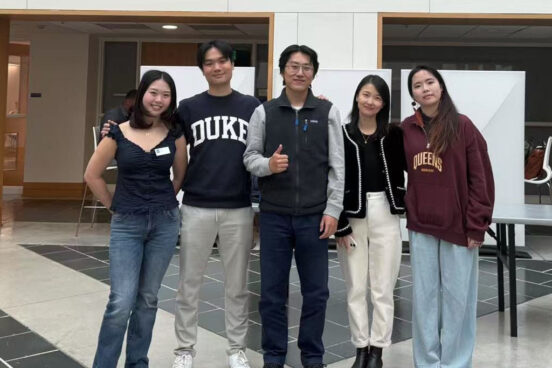Duke MMS Student Blog

How MMS’ Team-Focused Structure Eased My Transition as an Athlete
The team-focused structure of the MMS program was ideal because I was joining a new academic team in addition to being welcomed to Duke’s cross country team in the fall.

When I showed up to my first day of class at Fuqua, I had no idea what a balance sheet was, much less how to balance one. I decided to do the MMS program because it seemed like a great way to round out my computer science and Spanish background from undergrad. It also gave me the opportunity to compete on the track and field and cross country teams at Duke.
I was apprehensive going in because I had such limited exposure to anything described in the curriculum, and I was worried that I would be in over my head academically, all while trying to balance a busy practice and meet schedule. But, I was pleasantly surprised to find many of my classmates in similar situations. This, in addition to the team-focused structure of the MMS program, made for a seamless transition to Duke and MMS.
A New Academic Challenge
At Fuqua, I found myself in class with a diverse group of students, and everyone was coming into something new. My classmates had a mix of various undergrad majors, came from a variety of geographic locations, and were interested in many extracurricular activities. This was incredibly different from my undergrad experience because my new classmates all studied different subjects. It seemed like every major possible was being represented. But in the MMS program, we were united in that we all had to adjust to a new workload and class format at the same time.
It was comforting to be surrounded by people who were driven because they chose MMS in addition to their prior education, but who also needed to ask questions and figure things out as they went. There were some people who had a grasp on the concepts in certain classes if they came from a finance background, but for the most part, the material was all brand new to us. I never felt out of place or like I didn’t belong in class, even though I was lost when I began some courses.
Team-Focused Learning
The team-focused structure of the MMS program was ideal because I was joining a new academic team in addition to being welcomed to Duke’s cross country team in the fall. In the first three terms, I was placed on a team of four that included one other athlete. Then in the last two terms, all five members of my group were on different athletic teams. Both professors and students that I worked with were very understanding of busy practice schedules.
My team mastered the skill of prioritization by scheduling quick Zoom sessions to debrief and figure out how to get our assignments done. Being able to complete all of my assignments in a small group of students also allowed me to build a stronger relationship with these people than I was able to with all 70 students in my section. I really appreciated being able to text quick questions for help on assignments and found this small group to be monumental in aiding my easy transition to Duke.



